
Corybas, commonly known as helmet orchids, is a genus of about 120 species of plants in the orchid family, Orchidaceae. Helmet orchids are small, perennial, deciduous herbs and are nearly always terrestrial. They have a single leaf at their base and a single flower on a short stalk, the flower dominated by its large dorsal sepal and labellum. Species of Corybas are found in Australia, New Zealand, New Guinea, Southeast Asia, the Himalayas, southern China, many Pacific islands and a few sub-Antarctic islands.

Corybas hispidus, commonly known as the bristly helmet orchid, is a species of orchid endemic to eastern Australia. It is distinguished from other helmet orchids by its autumn to winter flowering period, and by its labellum, which has a bristly-hairy, creamy-white centre and is deeply notched along its top edge.
Corybas abditus, commonly known as the swamp helmet orchid or small helmet orchid , is a species of terrestrial orchid endemic to Western Australia. It is a rare orchid with a single bluish green, heart-shaped leaf and a small flower with an enlarged dorsal sepal and tube-shaped labellum.

Corybas acuminatus, commonly known as the dancing spider orchid or helmet flower, is a species of terrestrial orchid endemic to New Zealand. It has a triangular, sharply pointed leaf and a small translucent, greenish-white flower with purple markings and with very long sepals. It is found on both the main islands of New Zealand and also some of the off-shore islands.

Corybas barbarae, commonly known as fairy lanterns, is a species of terrestrial orchid endemic to eastern Australia including Lord Howe Island. It has a single dark green or reddish green, heart-shaped leaf and a small sparkling white or pinkish flower with an inflated dorsal sepal obscuring its hairy labellum.
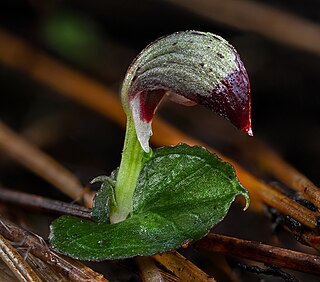
Corybas cheesemanii, commonly known as Cheesemans spider orchid or spurred helmet orchid, is a species of terrestrial orchid endemic to New Zealand. It is a small orchid with a single pale green, heart-shaped leaf and usually only a single flower variously coloured from maroon to completely white. It usually grows in deep shade, often in deep leaf litter and flowers in autumn and winter.
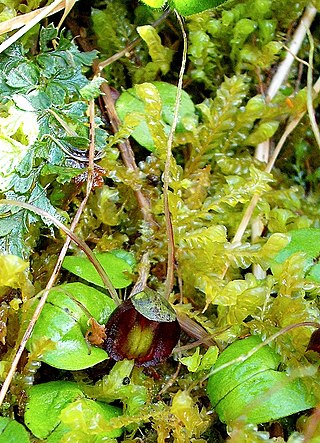
Corybas confusus, commonly known as the spider orchid is a species of terrestrial orchid endemic to New Zealand. It has a single heart-shaped leaf and a single dark green or light green flower with reddish maroon streaks and blotches and long, thread-like lateral sepals and petals. It grows in highland areas on both main islands.
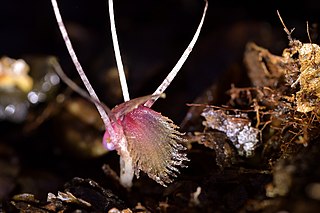
Corybas cryptanthus, commonly known as the hidden spider orchid or icky, is a species of terrestrial orchid endemic to New Zealand. It has no obvious leaves and the mostly white flower is usually buried in leaf litter. The plant is usually only detected by its fruiting capsule which is borne on a stem which elongates up to 280 mm (10 in) high.
Corybas expansus, commonly known as the flared helmet orchid or dune helmet orchid is a species of terrestrial orchid that is endemic to South Australia. It has a heart-shaped to more or less round leaf and a single purplish flower with greenish or transparent areas.
Corybas fordhamii, commonly known as the banded helmet orchid or swamp helmet orchid, is a species of terrestrial orchid endemic to south-eastern Australia. It has an egg-shaped to heart-shaped leaf and a reddish to reddish purple flower which leans forward. It is similar to C. unguiculatis which does not grow in swamps and has a different labellum.
Corybas montanus, commonly known as the montane helmet orchid, is a species of terrestrial orchid endemic to Queensland. It forms small colonies and has single heart-shaped to round leaf and a reddish, self-pollinating flower with a curved dorsal sepal. It is only known from the Mount Barney National Park in south-east Queensland.
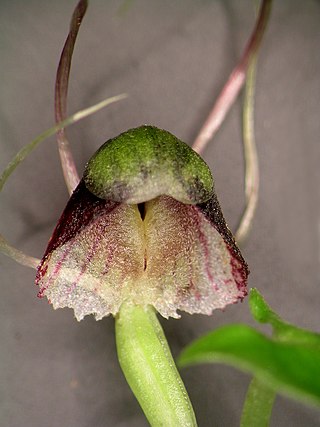
Corybas vitreus is a species of orchid endemic to New Zealand, and first described in 2016 by Carlos Adolfo Lehnebach.

Corybas oblongus is a species of terrestrial orchid endemic to New Zealand. It has a solitary oval-shaped leaf, often patterned with maroon, and a reddish-purple and white flower with a fimbriate labellum.
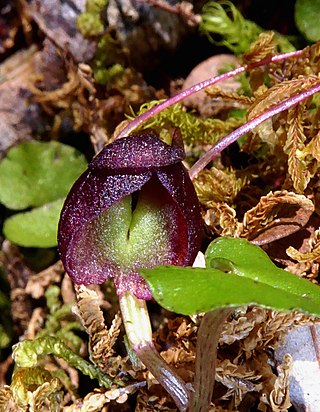
Corybas obscurus is a species of terrestrial orchid endemic to New Zealand. It has a solitary heart-shaped leaf and a deep crimson or nearly black flower and is part of the Corybas trilobus aggregate.

Corybas trilobus is a species of terrestrial orchid endemic to New Zealand. It is part of the C. trilobus aggregate, whose members are characterized by a funnel or dish-shaped labellum and an often heart or kidney-shaped solitary leaf.

Corybas hatchii is a species of terrestrial orchid endemic to New Zealand. It has a solitary rounded leaf, often flecked with maroon, and a single pale green and maroon flower with long, threadlike lateral sepals and petals.
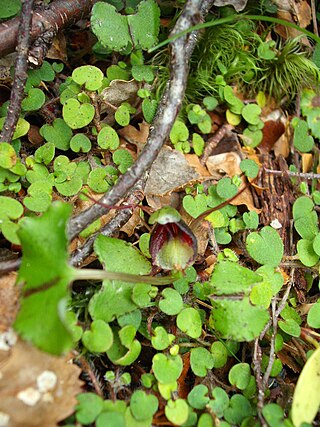
Corybas hypogaeus is a species of terrestrial orchid endemic to the New Zealand. It is part of the C. trilobus aggregate, whose members are characterized by a funnel or dish-shaped labellum and an often heart or kidney-shaped solitary leaf.

Corybas iridescens is a species of terrestrial orchid endemic to the New Zealand. It has a solitary fleshy oval-shaped leaf and a single deep crimson flower, sometimes accompanied with green, with a tapering dorsal sepal.
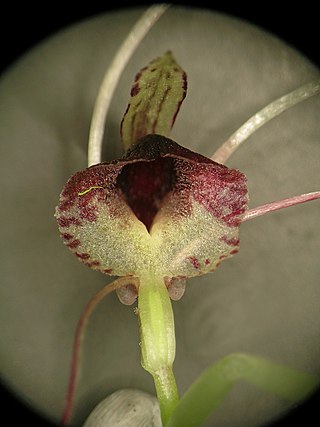
Corybas papillosus is a species of terrestrial orchid endemic to the New Zealand. It has a solitary rounded leaf with a heart-shaped base and a single flower with a long, slender green dorsal sepal, as well as a crimson and white labellum.
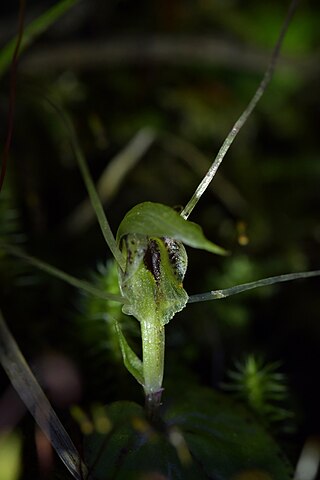
Corybas papa is a species of terrestrial orchid endemic to the North Island of New Zealand. It has a solitary wedge-shaped leaf and single translucent green flower with a strongly deflexed labellum and slender, threadlike lateral sepals and petals.

















